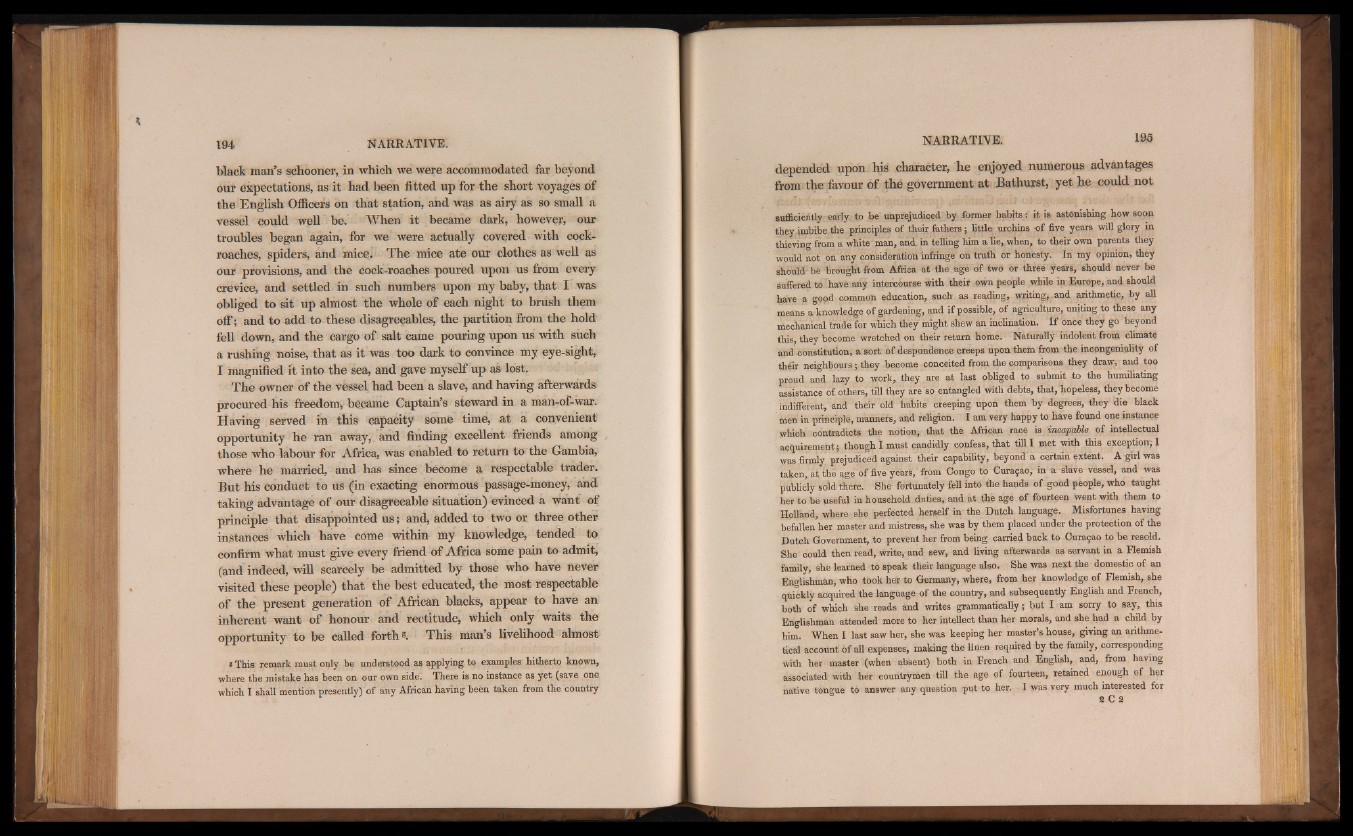
black man’s schooner, in which we were accommodated far beyond
our expectations, as it had been fitted up for the short voyages of
the English Officers on that station, and was as airy as so small a
vessel could well be. When it became dark, however, our
troubles began again, for we were actually covered with cockroaches,
spiders, and mice. The mice ate our clothes as well as
our provisions, and the eock-roaches poured upon us from every
crevice, and settled in such numbers upon my baby, that I was
obliged to sit up almost the whole of each night to brush them
off; and to add to these disagreeables, the partition from the hold
fell down, and the cargo of salt came pouring upon us with such
a rushing noise, that as it was too dark to convince my eye-sight,
I magnified it into the sea, and gave myself up as lost.
The owner of the vessel had been a slave, and having afterwards
procured his freedom» became Captain’s steward in a man-of-war.
Having served in this capacity some time, at a convenient
opportunity he ran away, and finding excellent friends among
those who labour for Africa, was enabled to return to the Gambia,
where he married, and has since become a respectable trader.
But his conduct to us (in exacting enormous passage-money, and
taking advantage of our disagreeable situation) evinced a want of
principle that disappointed us; and, added to two or three other
instances which have come within my knowledge, tended to
confirm what must give every friend of Africa some pain to admit,
(and indeed, will scarcely be admitted by those who have never
visited these people) that the best educated, the most respectable
of the present generation of African blacks, appear to have an
inherent want of honour and rectitude, which only waits the
opportunity to be called forthg. This man’s livelihood almost
I This remark must only be understood as applying to examples hitherto known,
where the mistake has been on our own side'. There is no instance as yet (save one
which I shall mention presently) of any African having been taken from the country
depended upon his character, he enjoyed numerous advantages
from the favour of the government at Bathurst, yet he could not
sufficiently early to be unprejudiced by former habits: it is astonishing how soon
they imbibe the principles of their fathers; little urchins of five years will glory in
thieving from a white man, and in telling him a lie, when, to their own parents they
would riot on any consideration infringe on truth or honesty. In my opinion, they
should be brought from Africa at the age of two or three years, should never be
suffered to have any intercourse with their own people while in Europe, and should
have a gopd common education, such as reading, writing,-and arithmetic, by all
a knowledge of gardening, and if possible, of agriculture, uniting to these any
mechanical trade for which they might shew an inclination. If once they go beyond
this, they become wretched on their return home. Naturally indolent from climate
and constitution, a sort of despondence creeps upon them from the incongeniality of
their neighbours; they become conceited from the comparisons they draw, and too
proud and lazy to work, they are at last obliged to submit to the humiliating
assistance of others, till they are so entangled with debts, that, hopeless, they become
indifferent, and their old hahits creeping upon them by degrees, they die black
men in principle, manners, and religion. I am very happy to have found one instance
which contradicts the notion, that the African race is incapable of intellectual
acquirement; though I must candidly confess, that till I met with this exception;!
was firmly prejudiced against their capability, beyond a certain extent. A girl was
taken, at the age of five years, from Congo to Curasao, in a slave vessel, and was
publicly sold there. She fortunately fell into the hands of good people, who taught
her to be useful in household duties, and at the age pf fourteen went with them to
Holland, where she perfected herself in the Dutch language. Misfortunes having
befallen her master and mistress, she was by them placed under the protection of the
Dutch Government, to prevent her from being carried back to Curasao to be resold.
She could then read, write, and sew, and living afterwards as servant in a Flemish
family, she learned to speak their language also. She was next the domestic of an
Englishman, who took her to Germany, where, from her knowledge of Flemish, she
quickly acquired the language of the country, and subsequently English and French,
both of which she reads and writes grammatically; but I am sorry to say, this
TtoglUhm«n attended more to her intellect than her morals, and she had a child by
him. When I last saw her, she was keeping her master’s house, giving an arithme-
ticai account of all expenses, making the linen required by the family, corresponding
with her master (when absent) both in French and English, and, from having
associated with her eountrymen till the age of fourteen, retained enough of her
native tongue to answer any question put to her. I was very much interested for
8 C 8